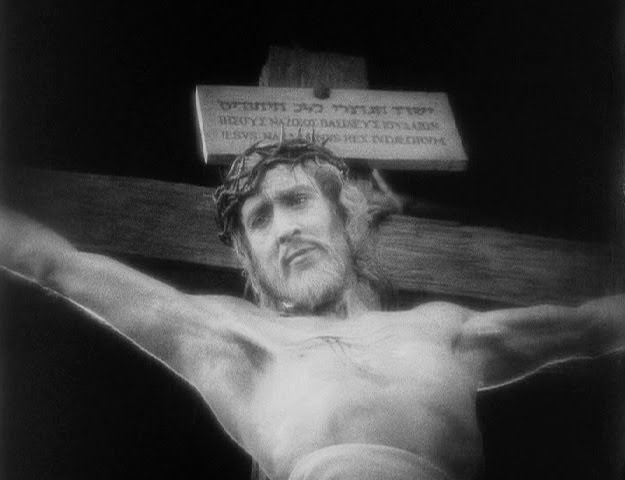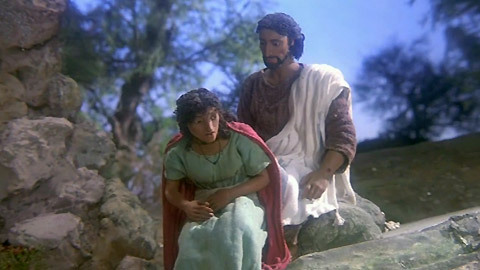The Jesuses that Pat Forgot!
My esteemed colleague Pat Archbold’s lively and engaging post on big-screen Jesuses has obliged me to add a few notes of my own (with apologies for the post title joke—I don’t really think Pat “forgot” anything, since his list wasn’t meant to be exhaustive in the first place, and certainly mine isn’t either).
Judging from Pat’s combox, the best big-screen Jesus for a lot of people is either Robert Powell of Jesus of Nazareth or Jim Caviezel of The Passion of the Christ. I think there’s a lot to be said for both, although obviously no actor could truly do Jesus justice, and both performances have weak spots in my opinion.
Powell aptly conveys authority, fire and tenderness, but there are moments, particularly during miracle sequences, when, to quote Mike Hertenstein of Flickerings.com, Powell’s “Jedi-like histrionics” are a bit much. As for Caviezel, he embodies the Suffering Servant of the Passion narratives as well as any actor could, I think—yet he’s less convincing, at least to me, in the crucial flashback sequences as the New Moses of the Sermon on the Mount and the High Priest of the Last Supper. (On the other hand, both films have utterly flawless Blessed Virgins, in my opinion: I can find no fault in either Olivia Hussey or Maia Morgenstern.)
What other big-screen Jesuses deserve mention? I won’t go through all the Jesuses that Pat considers—or even all the Jesuses he doesn’t. (For example, I have nothing to say about the Musical Jesuses of Godspell and Jesus Christ Superstar, except to say that, for me, they are, simply, Not Jesus. I’m also aware that I’m skipping a number of others.) But there are some that I want to highlight ... including my own favorite screen Jesus of all time, which so far has gone unmentioned.
Let’s begin with a couple of Jesuses from the Vatican film list. First, there’s Enrique Irazoqui, a half-Jewish, half-Basque economics student who had never acted before played Jesus in Pier Paolo Pasolini’s The Gospel According to St. Matthew.

I think Irazoqui was about 21 when he played the role, making him possibly the youngest big-screen Jesus. If I were going to hang a facetious, Archbold-style handle on him, though, I might go with Marxist Jesus. Pasolini was a Marxist, and a lot of people have felt that Irazoqui’s firebrand prophet is a Marxist rabblerouser in Galilean guise—though I don’t feel that way myself, and very much like the film’s portrayal.
Second, there’s one of the earliest screen Jesuses in any extant film: the 1905 Life and Passion of Jesus Christ. This is an extraordinary document from the very beginning of the cinema era, more like a set of filmed vignettes from a stage play than a film drama per se. The actor playing Jesus is fine in that context—not very convincing, but he gets the job done. Sort of like a second-rate department-store Santa Claus that even kids know isn’t the real Kris Kringle, but he’ll do. We might call this one Fat Stage Jesus (again, let me emphasize that I do love this film):

Another silent-era Jesus also warrants mention: H. B. Werner of Cecil B. DeMille’s silent masterpiece The King of Kings. For most readers the name DeMille conjures images of Charlton Heston as Moses in The Ten Commandments, but The King of Kings is a better and more genuinely spiritual film, and very much worth seeing.
Werner is an excellent Jesus, compassionate, dignified, authoritative, but too sedate in some sequences, like the cleansing of the temple. Already in his early 50s in the role, Werner was 20 years older than the actress playing His Blessed Mother, and so of course we must dub him Old Jesus. (Incidentally, Werner has a cameo in The Ten Commandments as the elderly Hebrew slave who dies in Moses’ arms after being struck by an Egyptian in the mud pits. (His most familiar role might be as Mr. Gower the pharmacist in It’s a Wonderful Life.)

Finally, if I had to pick my favorite big-screen Jesus ...
... well, I’m not sure I wouldn’t pick this one:

That’s right: A stop-motion figure made by Russian puppeteers and voiced by Ralph Fiennes in the 2000 BBC production The Miracle Maker may be my favorite big-screen Jesus. (And yes, The Miracle Maker did play on the big screen, in the UK.)
Like an icon, a statue or a crucifix, this figure is Jesus to me in a way that no actor could ever be—even an actor who brings no baggage, who has no prior screen history, like Irazoqui. Fiennes’s line readings are wonderful, capturing everything from the peasant humor of some of Jesus’ sayings (e.g., the log in the eye) to the compassion of Jesus’ healing miracles to the desperation of the agony in the garden.
The Miracle Maker is arguably the best critically informed life-of-Christ ever made—the most historically credible depiction of Jesus’ work, death and resurrection ever filmed. (The Passion of the Christ is not a life-of-Christ film, and is more informed by Catholic devotional tradition than historical studies. Jesus of Nazareth is critically informed, but not as good as The Miracle Maker—and it departs far more substantially from the Gospel accounts, annoyingly so at times.)
The Miracle Maker also has the distinction of being the only Jesus film I can think of that does any kind of justice to the resurrection accounts. (The two silent Jesus movies mentioned above manage transcendent resurrection appearances, but the actual resurrection accounts in the Gospels are really honored only by The Miracle Maker.) Compare the graceful handling of Jesus’ post-resurrection appearance to Mary Magdalene in The Miracle Maker (shown above) to the awkward staging of the same scene in The Gospel of John, which has Jesus deliberately crouching with his face hidden behind a plant, as if he’s trying to look like a gardener.)
The Miracle Maker is indispensable Easter viewing for the whole family at Casa Greydanus. If you aren’t familiar with it yet, buy it now and watch it this year. I practically guarantee you won’t be disappointed.
Recent
- Benoit Blanc goes to church: Mysteries and faith in Wake Up Dead Man
- Are there too many Jesus movies?
- Antidote to the digital revolution: Carlo Acutis: Roadmap to Reality
- “Not I, But God”: Interview with Carlo Acutis: Roadmap to Reality director Tim Moriarty
- Gunn’s Superman is silly and sincere, and that’s good. It could be smarter.
Home Video
Copyright © 2000– Steven D. Greydanus. All rights reserved.